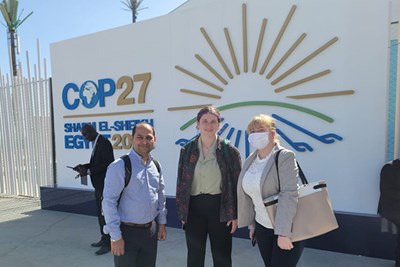Chioma Opara Among 10 Students Worldwide to Attend Nobel Week in Sweden
 Image by K. Webster
Image by K. Webster
02/17/2023
By Katharine Webster
When psychology major Chioma Opara saw a TikTok video about the Future Nobel Laureate Scholarship Program last April, she scrambled to apply by the early May deadline.
Opara, who is pursuing the health psychology concentration, was one of 10 students from around the world to win acceptance after writing an essay about how health disparities perpetuate and worsen social inequality. She says she’s seen the effects of health inequities both at home in Massachusetts and in Nigeria, where she often visits family.
The annual Nobel Scholars program, sponsored by the Nobel Prize Museum in Stockholm, included an online course last fall on intercultural communication, which the students completed on top of their regular university coursework.
The scholars also teamed up in small groups to work on projects on health inequities, universal basic income, and climate change and environmental degradation.
 Image by Courtesy
Image by Courtesy
“It was so cool,” Opara says. “A lot of the speakers were very science-oriented, but a couple really stuck out to me, especially the 2021 prizewinner in literature, Abdulrazak Gurnah. And we got to meet a couple of them afterward.”
She says the whirlwind week in Sweden also included working with her teammates to complete their health equity project and presentation, visiting the Nobel Prize Museum to see displays about past Nobel laureates and visits to some tourist sites, including the famed Christmas markets and the Royal Palace, which was lit up for the Nobel Week Lights Festival.
Opara was deeply moved by seeing an exhibit at the Nobel Prize Museum about 2014 Nobel Peace Prize winner Malala Yousafzai that included a headscarf she had donated. Yousafzai, a young woman from Pakistan, advocates for the right of girls and all children to receive an education.
Opara and the other Future Nobel Scholars will also leave their mark. “The amazing thing is that each team within the cohort will have its project on display in the Nobel Prize Museum next year,” she says.
 Image by Courtesy
Image by Courtesy
In Stockholm, the team presented their proposed solution, vaccinating children against tuberculosis, first to students at a local college of communications and then at the museum as part of Nobel Week.
Antipoverty vaccines are those that can prevent 20 “diseases of poverty,” including tuberculosis, that harm children’s development, Opara explains. While many of these diseases are treatable, people living in impoverished areas are more likely to get them because of crowded living conditions, malnutrition, poor sanitation and lack of access to clean drinking water.
Poor people in the Global South are also less able to access treatment or preventive care, and they and their families are more likely to become further impoverished because of the diseases’ debilitating and chronic effects, she says.
 Image by Courtesy
Image by Courtesy
At the museum, they also heard from educators about the importance of thinking creatively – and valuing other people’s input. They did an exercise with Legos, first solo and then in teams.
“They gave each one of us a few Legos, and they said, ‘We want to build you a duck with these five or six Lego pieces.’ We all had the same pieces, but we all had different ducks,” she says.
Through the group exercise in building a better duck by combining their Legos, she learned that “we may have gotten to one goal by ourselves, but together we need to listen to each other to get to an end goal that meets everyone’s needs.”
Opara, who plans to pursue a graduate degree in mental health counseling, says that her studies at UMass Lowell, research internships, jobs and volunteer positions all led up to her successful application for the Future Nobel Laureate Scholarship Program – and that she’s immensely grateful to the professors who guided and supported her.
The best part of the Nobel Scholars experience, Opara says, was connecting with so many people, including students from Argentina, Senegal, Australia, Malta, Ireland and New Zealand, who are fiercely dedicated to addressing major global challenges. She plans to maintain those connections and build on them.
“It was mind-expanding, and it helped alleviate some stress I had,” she says.
“All of us had some existential dread that no one is paying attention to these critical issues, so being in a room with people who care as much as you do about finding solutions – that alleviated a lot of anxiety I had about the state of the world.”




